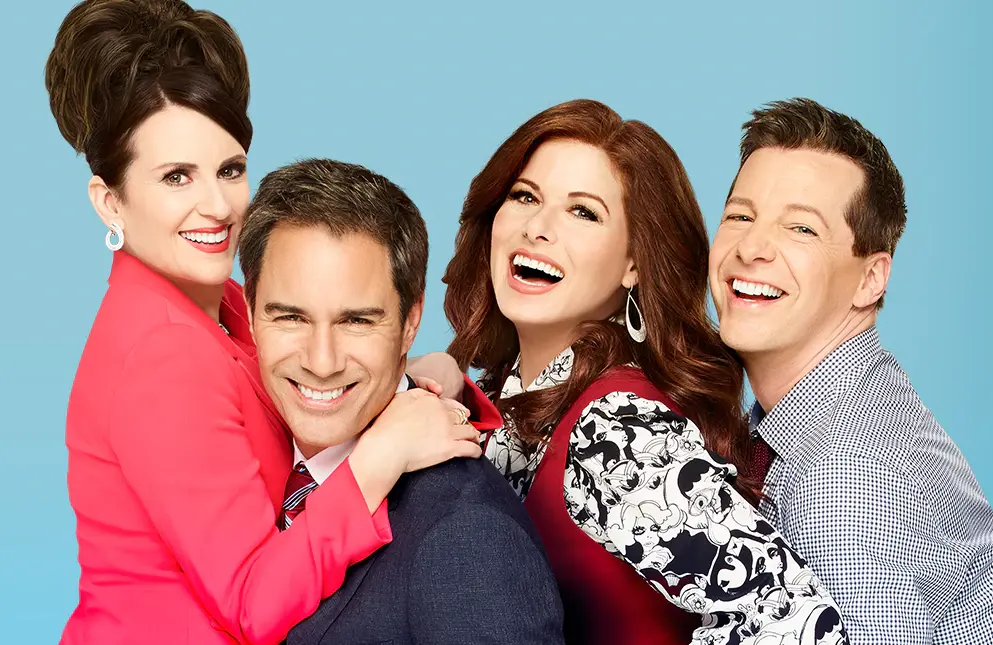A Skeptic's Guide to Will & Grace's Second Farewell Season
-
 Megan Mullally, Eric McCormack, Debra Messing and Sean Hayes in Will & Grace. (Photo: Andrew Eccles/NBC)
Megan Mullally, Eric McCormack, Debra Messing and Sean Hayes in Will & Grace. (Photo: Andrew Eccles/NBC)We have reached yet another final season of Will & Grace. A "farewell season," as NBC is calling it in promos. The 11th season premieres Thursday for one last 18-episode run (or at least one presumes it will be the last).
Forgive the skepticism, but arguably it's deserved. After all, the sitcom about New York odd couple Will Truman (Eric McCormack) and Grace Adler (Debra Messing) had its first final season back in 2006, after an initial eight-season run. But after a one-off skit tied to the 2016 election, the wave of revivals in the mid-2010s brought Will and Grace back to NBC, alongside narcissistic actor Jack MacFarland (Sean Hayes) and rich bitch with a heart of gold Karen Walker (Megan Mullally). Originally presented to viewers as a brief return to the Will & Grace world, solid ratings at a time when few new series were hitting led to NBC greenlighting an additional two seasons of the revival. And so the sitcom has lived two separate lives on the network, separated by a gulf of over a decade.
Looking back at the last two years, it’s hard to discern exactly what benefit the revival has served. While ratings for the ninth season were roughly on par with the original "farewell season" in 2006 — a marvel, considering how network TV ratings have declined across the board in that time span — last season’s ratings fell to a measly average of 5.31 million. That’s a far cry from the show’s heyday in the early 2000s, when its average viewership was well over three times that amount. Critical response also grew harsher last season, as the bloom came off of the revival rose.
Will & Grace was never a subtle show, what with its assortment of "top" and "bottom" jokes and mid-size cavalry of guest stars in its later seasons. But at its core, it had one of the best ensembles on television, one of only two (the other being The Golden Girls) to win Emmys for every main cast member. Seeing Will, Grace, Karen, and Jack again is largely what fueled enthusiasm for the revival in the first place. It wasn’t like people were clamoring for the central plot of Will & Grace to return. While revolutionary at the time, a sitcom with cisgender, white, gay male characters isn't exactly groundbreaking these days.
Even if you were to argue for the revival as a useless but still fun extension of the original show, it does seem to have done permanent damage to that four-person ensemble. Rumors have been flying for months that Debra Messing and Megan Mullally are no longer friends — rumors fueled by the stars’ own Instagram activity. (An unfollow here, a set photo without one of them there … it all adds up.) McCormack has tried to diffuse the rumors, but his efforts have been unconvincing.
There's also the very real possibility that this farewell won't truly be a farewell. After reuniting twice, the idea that these actors will never play these characters again? It may be goodbye for now, but I'm not convinced it's goodbye forever. Hopefully for fans, it’s not also "good riddance."
People are talking about Will & Grace in our forums. Join the conversation.
Kevin O'Keeffe is a writer, host, and RuPaul's Drag Race herstorian living in Los Angeles.
TOPICS: Will & Grace, NBC, Debra Messing, Eric McCormack, Megan Mullally, Sean Hayes, Revivals